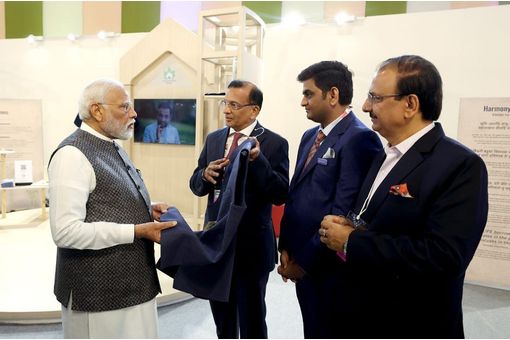Interviews
News Flash
Trevira commissions ecobalance study on PSF production
07 Dec '11
4 min read
Customers, users and consumers are showing growing interest in information about the ecologically relevant properties of Trevira products. In a move to respond to this, the fibre manufacturer has commissioned consultants Systain (Hamburg/Germany) to produce an ecobalance to ISO 14040/44. Systain specialises in projects to do with issues of corporate social responsibility (CSR).
For this “ecological footprint” Systain has assessed all the processes involved in the manufacture of Trevira polyester products, from chemical precursors and raw materials to the finished article – that is, from the oil well to the Trevira loading ramp. The investigation goes far beyond the CO2 balance or carbon footprint, which is often requested. This reveals the total amount of carbon dioxide emissions caused by the manufacture of products and services and provides a measurement of the impact on the climate.
The aim of the study was to define use of resources and their effects on the environment and to present a comparison with the most frequently used natural fibre (cotton). Criteria for this comparison are climate protection (CO2 emissions) and consumption of resources in terms of productive land, water and energy, the ecological and human toxicity and ozone degradation, summer smog, eutrophication and acidification. Evaluations were based on one kilogram of textile fibres. In manufacturing its polyester products Trevira emerges better than cotton in 8 out of 11 categories.
“Our customers ask us more and more frequently for concrete data on the sustainability of Trevira products“, says Anke Vollenbröker, Head of Marketing. “So it is important for us to show, beyond the few available general data on polyester, where we stand here with our products. Manufacturing polyester is not an instantaneous process: it involves several stages. Important elements are the way production processes are set up and how we deal with resources or avoid emissions, what happens to effluent and what our management of energy is like. Our documentation on Trevira sustainability deals with all these matters“.
The main results:
Trevira polyester products clearly come out better than cotton in the categories water and space requirement, eutrophia (potential for over-fertilisation), and ecological toxicity (pollution of water, soil and air). The production of 1 kg of staple fibres takes up only 15 litres of water during the whole supply chain, and here the lion's share goes on the production of raw materials (extracting and processing oil). According to the study, the same amount of cotton fibres requires up to 7.442 litres, depending on the area of cultivation.
As with other natural fibres, large productive agricultural areas are needed for cotton, while the manufacture of Trevira fibres and yarns only requires space for the extraction and processing of raw materials and for the on-site production zones. Trevira polyester products also emerge slightly better than cotton in the factors human toxicity and acidification. When compared, polyester and cotton emerge about the same in the categories climate protection and ozone degradation.
For this “ecological footprint” Systain has assessed all the processes involved in the manufacture of Trevira polyester products, from chemical precursors and raw materials to the finished article – that is, from the oil well to the Trevira loading ramp. The investigation goes far beyond the CO2 balance or carbon footprint, which is often requested. This reveals the total amount of carbon dioxide emissions caused by the manufacture of products and services and provides a measurement of the impact on the climate.
The aim of the study was to define use of resources and their effects on the environment and to present a comparison with the most frequently used natural fibre (cotton). Criteria for this comparison are climate protection (CO2 emissions) and consumption of resources in terms of productive land, water and energy, the ecological and human toxicity and ozone degradation, summer smog, eutrophication and acidification. Evaluations were based on one kilogram of textile fibres. In manufacturing its polyester products Trevira emerges better than cotton in 8 out of 11 categories.
“Our customers ask us more and more frequently for concrete data on the sustainability of Trevira products“, says Anke Vollenbröker, Head of Marketing. “So it is important for us to show, beyond the few available general data on polyester, where we stand here with our products. Manufacturing polyester is not an instantaneous process: it involves several stages. Important elements are the way production processes are set up and how we deal with resources or avoid emissions, what happens to effluent and what our management of energy is like. Our documentation on Trevira sustainability deals with all these matters“.
The main results:
Trevira polyester products clearly come out better than cotton in the categories water and space requirement, eutrophia (potential for over-fertilisation), and ecological toxicity (pollution of water, soil and air). The production of 1 kg of staple fibres takes up only 15 litres of water during the whole supply chain, and here the lion's share goes on the production of raw materials (extracting and processing oil). According to the study, the same amount of cotton fibres requires up to 7.442 litres, depending on the area of cultivation.
As with other natural fibres, large productive agricultural areas are needed for cotton, while the manufacture of Trevira fibres and yarns only requires space for the extraction and processing of raw materials and for the on-site production zones. Trevira polyester products also emerge slightly better than cotton in the factors human toxicity and acidification. When compared, polyester and cotton emerge about the same in the categories climate protection and ozone degradation.
Popular News
Leave your Comments
Editor’s Pick
































-Ltd..jpg?tr=w-120,h-60,c-at_max,cm-pad_resize,bg-ffffff)





.jpg?tr=w-120,h-60,c-at_max,cm-pad_resize,bg-ffffff)
.jpg?tr=w-120,h-60,c-at_max,cm-pad_resize,bg-ffffff)






